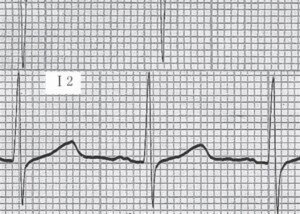
Online info about genetic LQTS always says that it “affects children and young adults.”
This implies long QT syndrome can be outgrown if it doesn’t kill first. It’s time to clarify this very misleading information.
Have you ever noticed that whenever there’s a new story about someone being diagnosed with long QT syndrome, the patient is either a child, teenager or in their 20s?
Stories about people dying from sudden cardiac arrest, for whom it’s subsequently discovered that they had undiagnosed long QT syndrome, involve children, teens or young adults.
Though acquired LQTS typically affects adults over 30 (e.g., caused by side effects of medications or untreated thyroid disease), it is the genetic version (which is far rarer) that’s so strongly associated with childhood.
“The highest risk of cardiac events is from infancy through early adulthood,” says Paul Rogers, MD, PhD, Medical Director, Cardiac Rhythm Device Clinic, Ochsner Health System.
“It is less common to have cardiac events from LQTS after age 40 unless a patient also develops an acquired trigger, such as certain electrolyte abnormalities or they take a QT-interval prolonging medication,” explains Dr. Rogers.
“Male gender is a risk factor for symptoms before age 15. Conversely, female gender has a higher risk for cardiac events after age 14.
“There are exceptions, however. LQTS 3 may carry a higher risk of cardiac events into adulthood than other genetic causes of LQTS.
“Also, patients who have had a prior cardiac event continue to have a future risk of an event.
“Importantly the longer the QT interval is, then the higher the risk is of having a cardiac event regardless of age.
“Crediblemeds.org is a good website that patients with LQTS can review prior to starting a new medication to see if it is known to cause QT prolongation.”
 Dr. Rogers has clinical interests in complex heart arrhythmias and the benefits of implantable cardiac device based therapies in patients with reduced heart function.
Dr. Rogers has clinical interests in complex heart arrhythmias and the benefits of implantable cardiac device based therapies in patients with reduced heart function.
 Lorra Garrick has been covering medical, fitness and cybersecurity topics for many years, having written thousands of articles for print magazines and websites, including as a ghostwriter. She’s also a former ACE-certified personal trainer.
Lorra Garrick has been covering medical, fitness and cybersecurity topics for many years, having written thousands of articles for print magazines and websites, including as a ghostwriter. She’s also a former ACE-certified personal trainer.
.


























